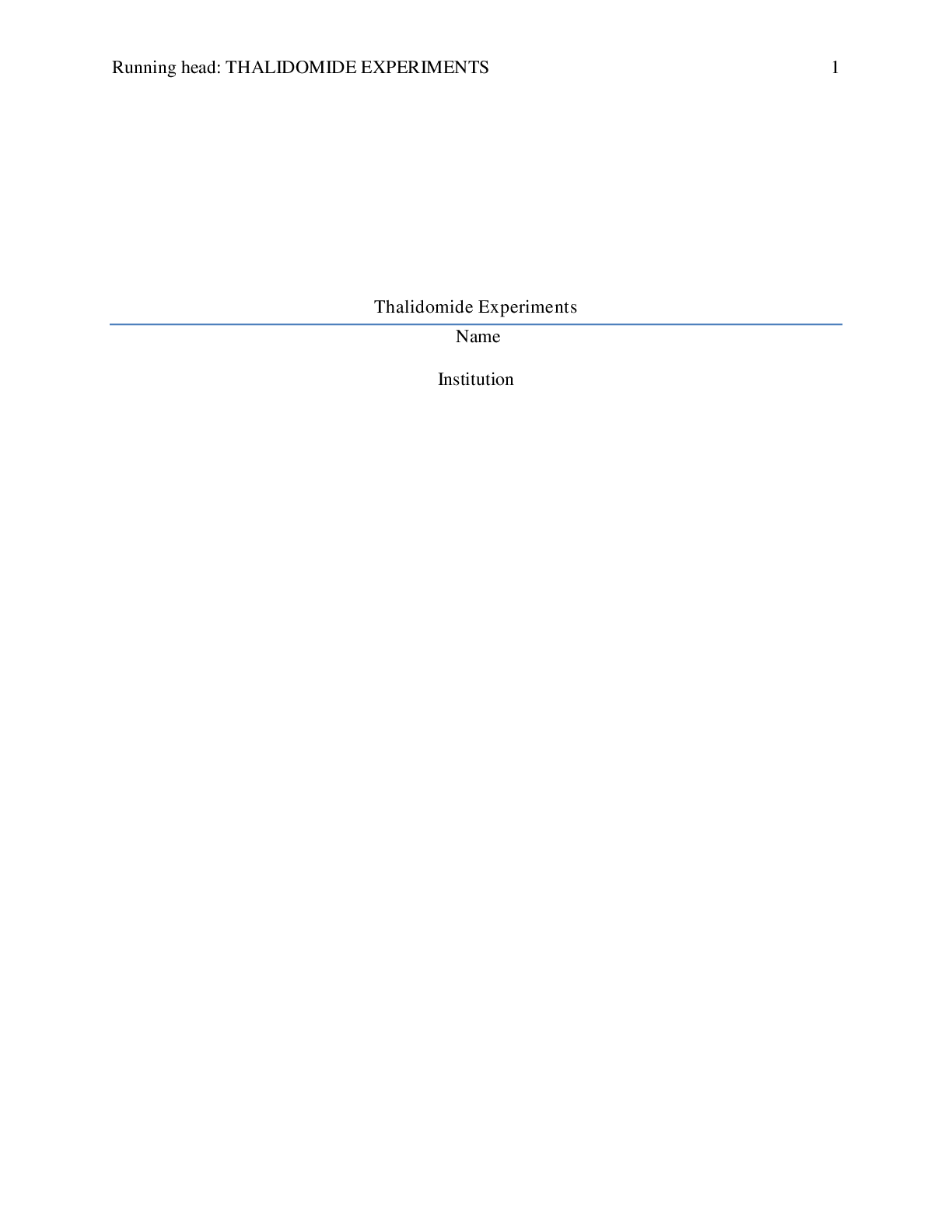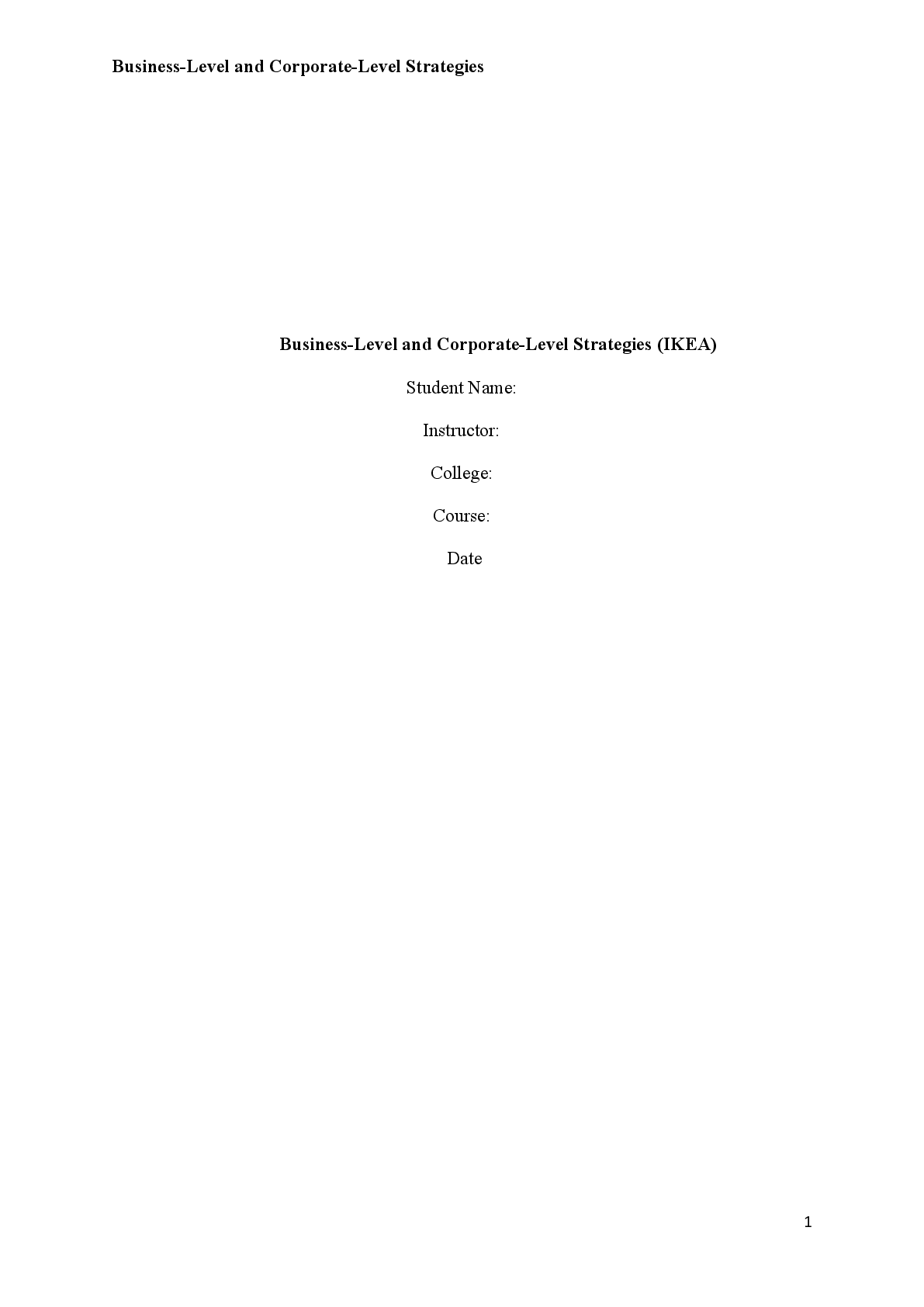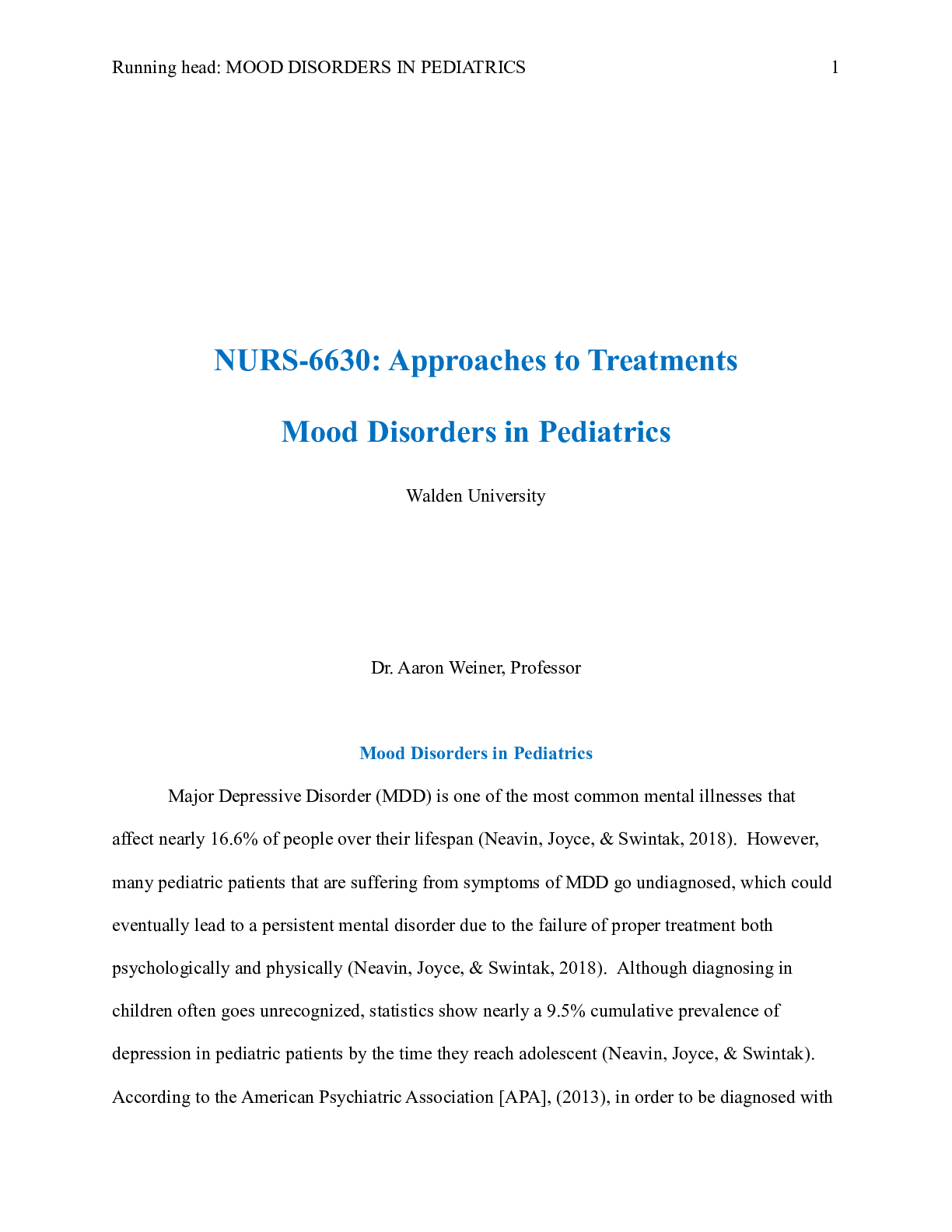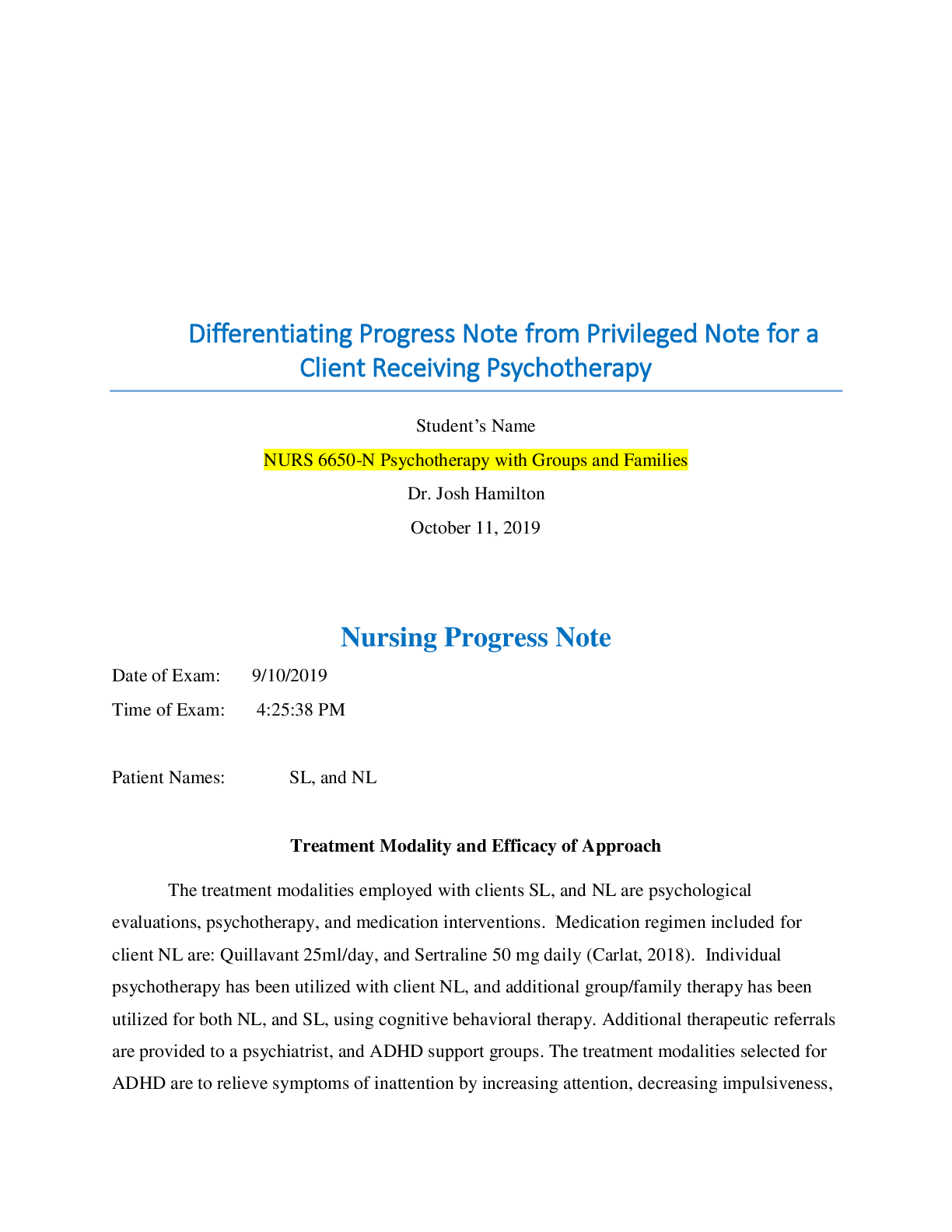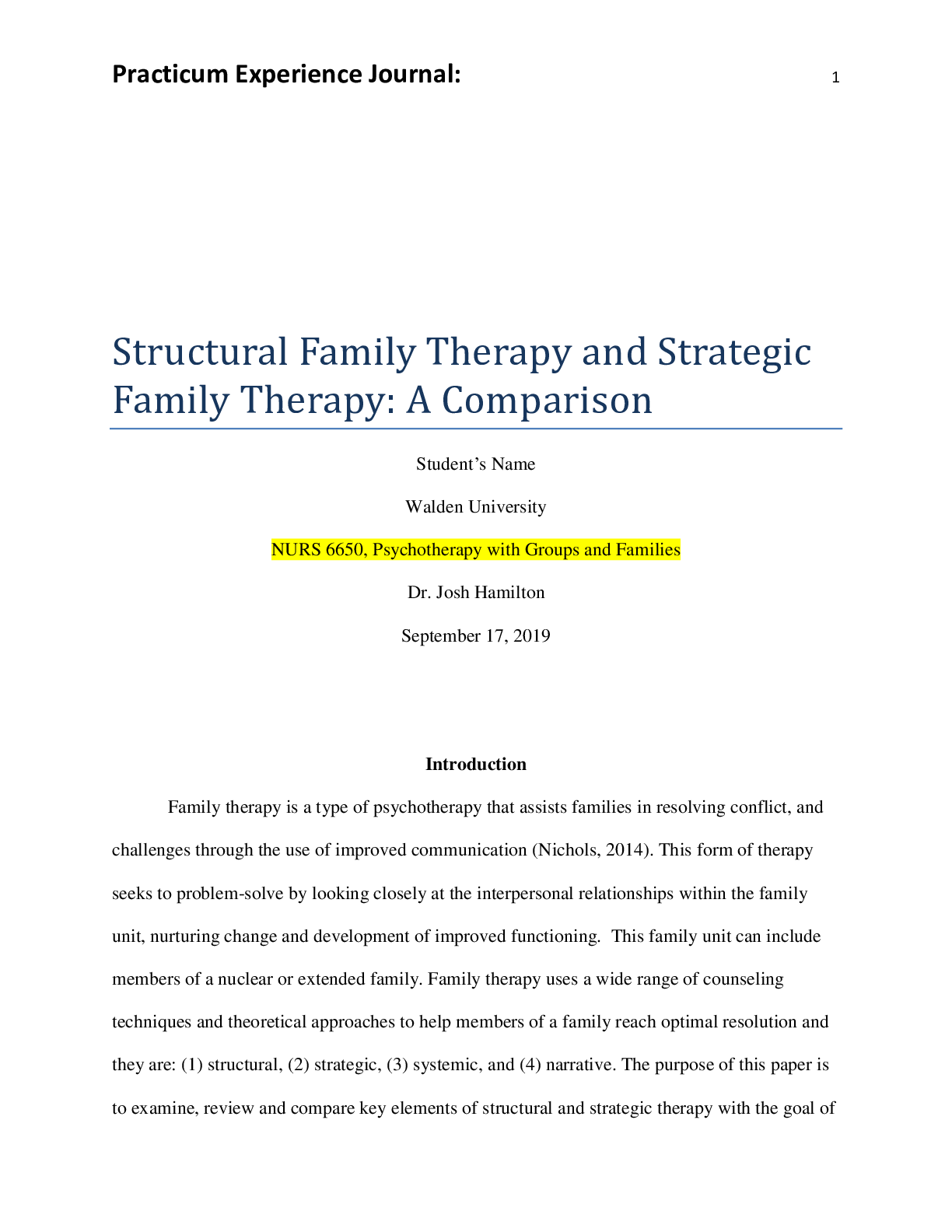English Literature > Research Paper > University of South Africa: ENG 1501ENG1501 Novel - Small Things Analysis (All)
University of South Africa: ENG 1501ENG1501 Novel - Small Things Analysis
Document Content and Description Below
ENG1501 Short Story Analysis Themes Theme: Love Explore the protagonist's view of love and how it develops from childhood to adulthood. Is he consistent in how he understands love throughout his l ... ife? The protagonist’s view of love is not consistent with how he understands love throughout his life. During his childhood, he fell in love with Desiree and did everything he could to please her. “She appreciated the efforts, yet dismissed them as heart-warming but unnecessary”. (p7) Desiree never encouraged nor discouraged his pursuit of her. The fact that he kept on pursuing his love for her, shows that he did not understand the true meaning of love. He accepted the fact that his love for her was big enough for both of them. During his adulthood, he thinks that “there are many kinds of love” (p46). He perceives his love for Desiree as “an eloping kind, a love that constructs and abandons nests”. When Desiree ended up in the hospital with ruptured brain arteries, the protagonist reflects on his love for her. He says: “Maybe this is what love is – accepting the crudest possible treatment with the grace of a wise monk, the selflessness of a saint”. (p110) This confirms that he is still not sure what love is supposed to be. He also has a relationship with Mercedes and he admits that he “cannot tell which love, which beauty, is greater: Mercedes or Desiree”. (p78) He never confesses his love for Mercedes. “I am, when with Mercedes, incapable of any other emotion than gushes of tenderness, ticklish sensations that prompt giddy feelings beyond measure”. (p78) This statement suggests that he does not understand what love is. He is so fixated on his love for Desiree that he is misinterpreting his feelings for Mercedes. In the end, he still thinks that Desiree “is the only soul for whom my heart throbbed”. (p150) Theme: Art and its place/ role in society The protagonist has a very conflicting understanding of art, and yet his artworks are appreciated by different people in the text. Explain how other characters view the protagonist's art, and what this might say about how they view the protagonist. The protagonist started writing poems to Desiree during his childhood. Desiree did not appreciate the poems in the way he hoped she would. She did not respond to his poems and “would be moody and aloof”. (p6) She did not encourage, nor discourage his pursuit of her. Mercedes is touched by the protagonist’s tears after watching a trumpeter perform at The Hugh student performance. She told him that his tears “are not to be taken lightly – for anyone who is so affected by art is a priceless gift to the universe”. (p63) This is probably what prompted her to buy him a trumpet for his birthday. She saw the potential in him to be an artist, because he is a sensitive soul. She refers to him as “My Poet”. The protagonist plays his trumpet on street corners and relies on donations in order to survive. Sometimes he hears peoples’ remarks while playing and on one occasion he heard The Hugh night-watchman say that he is a “Lazy shit, he thinks money grows on trees”. (p91) The nightwatchman made his own assumptions about the protagonist’s situation, not realizing that he truly relies on donations to make a living. Theme: Inequality and ClassThe protagonist can be said to move through different social classes. He encounters those who are wealthy and he encounters those who are poor. Explain how the protagonist views these different characters, and how their social class impacts on his understanding of them. The protagonist encounters beggars whilst he is homeless and jobless, sleeping on park benches. He does not engage in conversation with them, because “they are too involved in their unknown thoughts”. When he gets a job as a waiter at Café Mesopotamia, he observes affluent patrons. He says: “There is this aura of self-importance about them, an arrogant expectation that disregards the wishes of others.” (p136). He finds it hard to serve them, “feigning interest in their self-indulgent stories”. The protagonist is of the opinion that the demands of the wealthy people are worse than the rude remarks he endured while playing his trumpet. He thinks that their nights out at Café Mesopotamia have little to do with eating, but more about showing off their “expensive cars and promiscuous lovers”. (p132) Theme: Friendship In many ways, the closest bond that the protagonist forms in the text is with a dog. Do you agree with this assessment? Explain your answer and link this to how the protagonist views his friendships and relationships, and why his relationship with the dog is so different. I do agree that in many ways, the closest bond that the protagonist forms in the text, is with a dog he named Benito. When he finds the puppy on his doorstep, he does not hesitate to take care of it. He talks to the puppy as though it can understand him. The puppy follows him everywhere and their relationship is built on trust, unlike his relationship with Desiree which is strained because of her bad temper. Desiree is the abusive one in the relationship whilst the protagonist is the one trying to take care of her. The protagonist’s relationship with Mercedes is based on his artistic talents. Even though he says that “I, in her company, feel bliss without form or limits” (p69), his feelings for Desiree prevents him from making a commitment towards Mercedes. The protagonist forms a close friendship with Gabriel Sanchez who is the father of Mercedes. He says: “I am, to him, a son brutalized by life, who finds solace in the folds of his daughter’s heart”. (p70) The friendship turns sour because the protagonist is unable to make his intentions clear with Mercedes. Gabriel returns to Cuba and takes Mercedes with him. The protagonist feels betrayed. From the above, we can see that his relationship with the dog was special. He committed himself to take care of the puppy under difficult circumstances such as being homeless and struggling to earn money to buy food for himself and the puppy. The dog was his companion and suffered some of the same hardships as the protagonist, namely being out on the street feeling cold and hungry. The dog stayed by the protagonist’s side until the day he was taken away by a biker, whereas Desiree, Mercedes, and Gabriel walked out of his life. Theme: History and the Transition There are many social changes that take place from the start of the novel to the point where the protagonist is released from prison. How do these social changes link to the history of South Africa? Are all of these changes positive? Why or why not? As you continue to consider this question, try and think about how the tone and mood at different points in the novel might indicate to you the change in the outlook of the protagonist. How does his thinking about South Africa become more cynical and disillusioned? How is he able toreconcile his feelings about being "free" with the immediate violence he is met with as he walks the streets of Johannesburg. The novel overall can be seen as quite negative about the changes in South Africa, and sees the gap between the haves and have-nots as just as strong as ever in postapartheid South Africa, You might also consider the question of race in relation to this quesiton. How does the protagonist see race relations? How many white characters does he encounter, and what are the roles of these characters in his life and how he navigates postapartheid South Africa? There might still be racial tensions in the text, and the narrator thus might be questioning what "freedom" has meant in terms of race in South Africa. Consider these questions in relation to the overall theme of history and the transition. Theme: The meaning of life The protagonist wonders about various ideas that might make up what he sees as the meaning of life. Discuss one of these ideas that the protagonist thinks might give his life meaning. Do you think that the protagonist suffers from disillusionment in the text? This question can take many forms. The protagonist might feel that freedom and creativity are important in the meaning of life, and he tries to practice this by not being constrained by the types of requirements of functioning well in the post apartheid setting he finds himself in. For example, he does not want to take the job from his politically connected acquaintance. Why not? He might feel like this does not give him the type of freedom and creativity that he has as a heritage guide in Johannesburg, where he is able to tell the story of the history of South Africa in his own way and not become part of the wealthy class in the city. He also feels great resentment to those who try to curtail his freedom and creativity, and in the end of the novel he seems to find quite a lot of meaning from just being on his own away from other people. Do you agree that he achieves a sense of freedom towards the end? Why or why not? Characters Desiree, the girl at school - chapter 1 pg 5: The narrator falls in love with her at a young age. Father Goebels - chapter 1 pg 8: He is a monk who picked on the narrator, he is a teacher. Father Ben: pg 9: he hears a confession that the narrator makes. Bra Todd - chapter 1 pg 11: He is Desiree's uncle. He becomes a father figure, carer and employer to the narrator. Major Joubert - chapter 2 pg 17: A police detective, captor and interrogator of the narrator. The Dark Figure - chapter 3 pg 28: He attempts to murder the narrator. Dr Moodley - chapter 3 pg 31: The narrator's physician Inspector Matros, Detective Govender - chapter 3 pg 31,32: Shows pictures of fugitives / murderers and asks about The Dark Figure. Ordette/Bernadette - chapter 4 pg 37: His boss at the Tourism Information Centre in Newtown. Gideon Bemba - chapter 4 pg 38: The owner of the furnished townhouse that the narrator rents. (Here the letting agent is not given a name).Thebe & the "lanky one" - chapter 4 pg 39 [Show More]
Last updated: 3 years ago
Preview 1 out of 17 pages
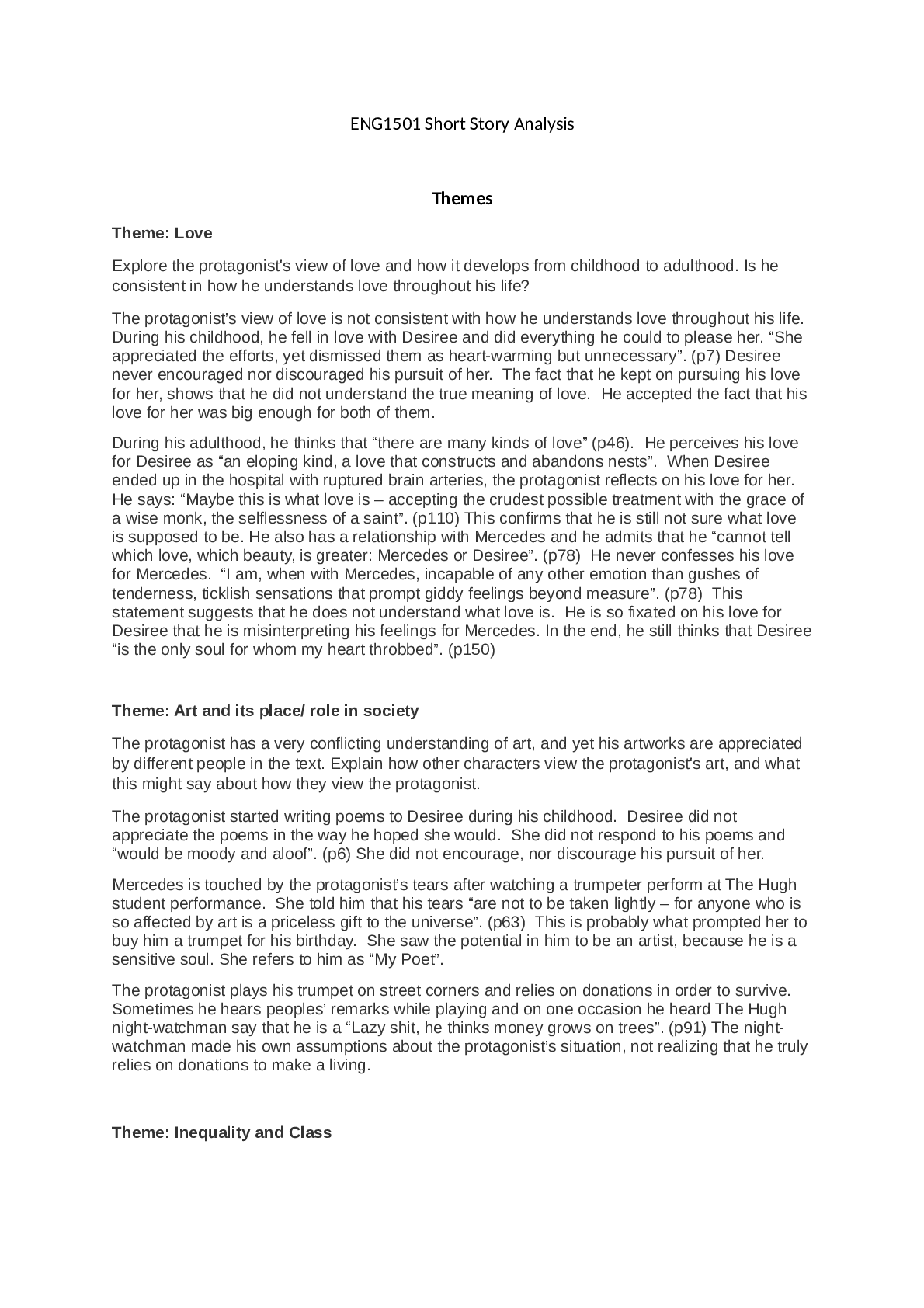
Buy this document to get the full access instantly
Instant Download Access after purchase
Buy NowInstant download
We Accept:

Reviews( 0 )
$9.00
Can't find what you want? Try our AI powered Search
Document information
Connected school, study & course
About the document
Uploaded On
Sep 22, 2022
Number of pages
17
Written in
All
Additional information
This document has been written for:
Uploaded
Sep 22, 2022
Downloads
0
Views
185

